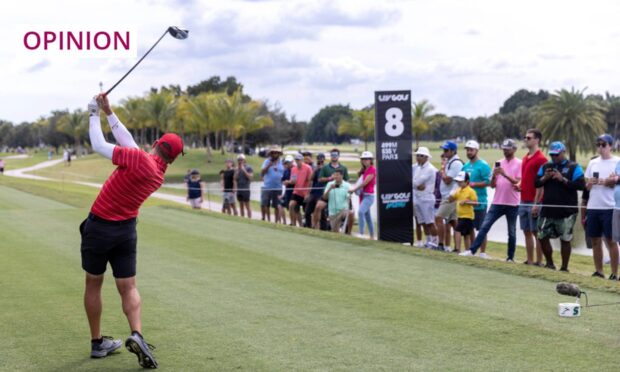There are 90 days to go until the Masters.
The Augusta Masters is probably the most important week of my year. As well as being the first golf major, it signals the start of spring, hope that the mud in Mintlaw might disappear, and longer nights.
Basically, I just need to get through January, then I see February as a process of four weeks, and then it’s just March left to suffer.
I’ve started the countdown because the first PGA golf tournament of this year just took place in Hawaii. For those not into golf, this is also relevant because the tournament was held without some of the world’s top golfers.
A rival competition called “LIV Golf” has been created. This is backed with money from Saudi Arabia, and it has split the world of golf. The process has also impacted fans, and people like me will continue to watch in dismay as the process unfolds through 2024.
At the start of the year, I usually give economic predictions. I tend to make them suitably vague in value and timing, so no one can say I was wrong. This year, however, I want to predict a change to the sporting world – or, maybe rather than predict, I’m giving free advice to foreign wealth funds.
There are many critics of the LIV Golf concept, along with the Saudi Pro League (football). Criticism has been levelled at both the quality of sporting excellence and the efforts to “sportswash” – using sport to improve the bad reputation of an organisation or nation.
I’m writing today to criticise how the money has been spent for these ventures. If it was mine, I would have done it differently.
Get fans and the press onside
The Saudi investment models have created “new” formats or events by paying the best sportspeople the most money. The beneficiaries have been individual sportspeople, with fans losing out and the events themselves achieving very limited levels of success, in terms of media coverage and sporting excellence. I’d question whether anyone views these efforts positively.
I cannot help but think there is a better way to spend the money in the future, though my approach needs a little more cash. Instead of buying the talent, I would “buy” the competitions, or de facto buy ownership through other routes.
This may seem fanciful, but the cash values of both golf and English Premier League football are massive but not, in the whole scheme of things, far out of the reach of a Saudi wealth fund.
The US Government has made some noises about halting any interference with the PGA golf tour and, likewise, the UK Government has mooted a football regulator that would look at club ownership.
This might stop the actual purchase of competitions, but it doesn’t stop anyone buying what controls the competitions. Even better if control can be achieved and fans are supportive, too. So, here is my plan.
Don’t ‘buy’ the talent – buy the media rights
The most recent PGA income statement suggests the Tour’s income was $1.6 billion for the year ending 2021, and media rights were nearly 40% ($600 million). In the 2021-22 season, the English Premier League clubs’ income was £5.8 billion, of which nearly 60% was from broadcast income (TV rights).
If I had a wealth fund and wanted to have more control of sport, rather than try to “buy” the talent, I would buy the media rights which, in effect, control the talent.
With free access, the ability to share messaging would be vast and effective, and the relative benefits high. Fans would love free access and be delighted with this gift
With the media rights, I would create my own channel which would be free to air, or give access to third parties. On that channel, all the adverts, promotions and in-game activity would promote whatever I choose.
With free access, the ability to share messaging would be vast and effective, and the relative benefits high. Fans would love free access and be delighted with this gift.
If any wealth fund wants to hire my expertise, my morality can be bought with a suitable fee. Something around 10% of Karim Benzema’s salary or 20% of Jon Rahm’s signing fee would do me just fine; I’m not greedy and think my idea will generate more impact than these two individuals have or will in the long-term.
Here’s to sporting success in 2024!
James Bream is CEO of Aberdeen-based Katoni Engineering and chair of DYW North East












Conversation